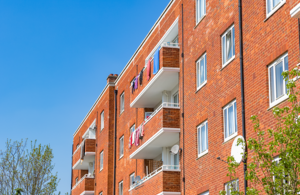New regime to deliver decent homes for social housing residents
Routine inspections and gradings will hold large social housing providers to account and ensure landlords are delivering for residents.

Failing social housing providers need to raise standards from today, to ensure all tenants live in decent homes and are treated with fairness and respect by their landlords.
Landlords will now be routinely inspected and held to account, to make sure they provide their residents with quality homes and services. Those who do not abide by these new rules face a range of potential sanctions, including appointing new management or unlimited fines.
This represents the most significant change to the regulation of social housing in a decade and follows the Social Housing (Regulation) Act, a landmark moment for the social housing sector. These new powers mean the Regulator can drive up standards and take action where providers fall short.
The rules now require landlords to:
- Have an accurate record on the condition of every home, based on checks of properties so landlords can understand any problems and take action.
- Set clear timelines for the completion of repairs, maintenance and planned improvements, communicating them clearly to tenants.
- Give tenants opportunities to influence and scrutinise their landlord’s services such as through meetings with tenant organisations.
- Provide tenants with information about their rights and how to make complaints.
- Publish the new tenant satisfaction measures to make it clear how tenants feel their landlord is performing and hold them to account.
Minister for Social Housing Baroness Scott said:
“Everyone deserves a decent home and to be treated with fairness and respect. That’s why we are taking strong action to improve the quality of social housing and the services landlords provide. If landlords fail their residents, there will be consequences.
“This is a significant milestone in our work to put right some of the issues laid bare by the devastating Grenfell Tower tragedy, and I have huge admiration for the bereaved families, survivors and community who have campaigned tirelessly for improvements in the sector.”
Fiona MacGregor, Chief Executive of the Regulator of Social Housing said:
“We welcome the new powers, which will put our consumer regulation on an equal footing with our economic role. We will hold landlords to account for delivering the outcomes of our new consumer standards and drive improvement across the social housing sector, for the benefit of tenants.“
Kwajo Tweneboa, Social Housing campaigner said:
“I hope this change in legislation will now mean a more proactive stance in scrutinising providers. For a long time Social Housing Providers have evaded accountability for providing substandard housing to many across the country.
“As someone who has experienced this first hand, I hope this change in regulation will be enforced with maximum effect and put an end to the misery so many are going through. The recognition that a safe and decent home is a necessity to the lives of us all and isn’t exclusive to those living outside of social housing should, I hope, mean a new era for many millions across the UK.”
The introduction of the new regime is just one of the measures the Government is taking to drive up the quality of social housing, having recently consulted on Awaab’s Law, which will introduce new requirements for landlords to fix hazards in social homes within fixed timeframes. The Government is also consulting on new competence and conduct requirements, to ensure that social housing staff have the skills, knowledge and experience to deliver good quality services.
At the same time, the existing social housing rent settlement will be rolled over by a further year until April 2026, so annual rent increases will continue to be capped at Consumer Price Index (CPI) plus one percentage point for 2025-26. This provides greater certainty for social housing tenants and landlords about levels of rent next year in light of the new consumer regulation regime.
To further hold landlords to account, they are now required by law to follow the requirements of the Housing Ombudsman Service’s Complaint Handling Code. This means all social landlords will now have to respond to complaints effectively and within set timescales, ending the postcode lottery on complaint responses previously experienced by residents.
Further information
- More information can be found here: Reshaping consumer regulation: Our new approach - GOV.UK (www.gov.uk)
- The Government’s ‘Make Things Right’ campaign – now in its fourth year – encourages social housing tenants to report issues and make complaints to their landlord. If tenants remain dissatisfied with the service their landlord is providing, then they can complain to the Housing Ombudsman.